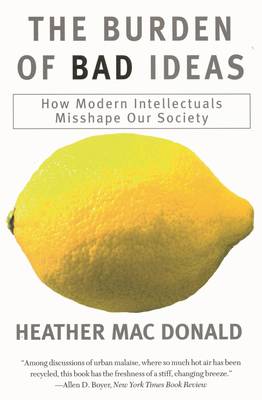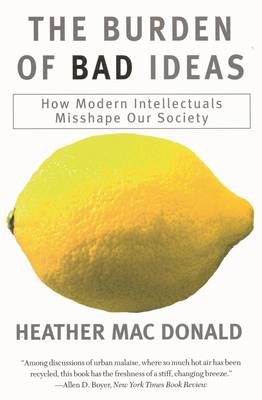
- Afhalen na 1 uur in een winkel met voorraad
- Gratis thuislevering in België vanaf € 30
- Ruim aanbod met 7 miljoen producten
- Afhalen na 1 uur in een winkel met voorraad
- Gratis thuislevering in België vanaf € 30
- Ruim aanbod met 7 miljoen producten
Zoeken
The Burden of Bad Ideas
How Modern Intellectuals Misshape Our Society
Heather MacDonald
Paperback | Engels
€ 20,95
+ 41 punten
Omschrijving
Critics have attacked the foolishness of some of today's elite thought from many angles, but few have examined the real-world consequences of those ideas. In The Burden of Bad Ideas, Heather Mac Donald reports on their disastrous effects throughout our society. At a Brooklyn high school, students perfect their graffiti skills for academic credit. An Ivy League law professor urges blacks to steal from their employers. Washington bureaucrats regard theft by drug addicts as evidence of disability, thereby justifying benefits. Public health officials argue that racism and sexism cause women to get AIDS. America's premier monument to knowledge, the Smithsonian Institution, portrays science as white man's religion. Such absurdities, Ms. Mac Donald argues, grow out of a powerful set of ideas that have governed our public policy for decades, the product of university faculties and a professional elite who are convinced that America is a deeply unjust society. And while these beliefs have damaged the nation as a whole, she observes, they have hit the poor especially hard. Her reports trace the transformation of influential opinion-makers (such as the New York Times) and large philanthropic foundations from confident advocates of individual responsibility, opportunity, and learning into apologists for the welfare state. In a series of closely reported stories from the streets of New York to the seats of intellectual power, The Burden of Bad Ideas reveals an upside-down world and how it got that way.
Specificaties
Betrokkenen
- Auteur(s):
- Uitgeverij:
Inhoud
- Aantal bladzijden:
- 256
- Taal:
- Engels
Eigenschappen
- Productcode (EAN):
- 9781566633963
- Verschijningsdatum:
- 24/07/2001
- Uitvoering:
- Paperback
- Formaat:
- Trade paperback (VS)
- Afmetingen:
- 160 mm x 228 mm
- Gewicht:
- 390 g

Alleen bij Standaard Boekhandel
+ 41 punten op je klantenkaart van Standaard Boekhandel
Beoordelingen
We publiceren alleen reviews die voldoen aan de voorwaarden voor reviews. Bekijk onze voorwaarden voor reviews.











